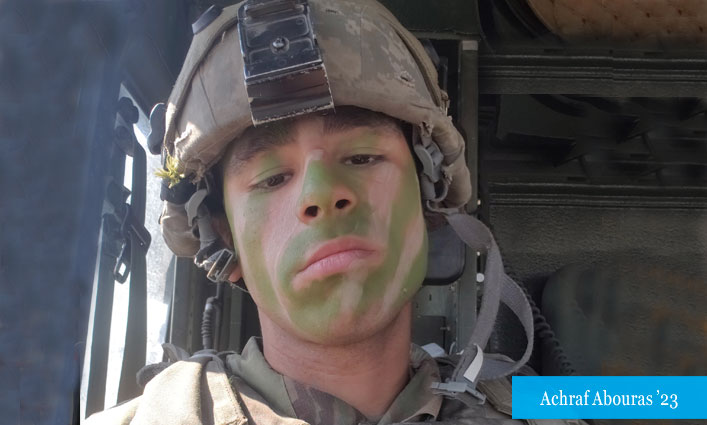
“I’ve always had this need to protect and help people,” says Achraf Abouras ’23, a forensic psychology major. “Hearing the stories about men in the military who sacrificed their lives for their country inspired me to join the Army.” Today, Abouras hopes to destigmatize mental health, especially for veterans. “I want to be a clinical psychologist and help heal people,” he says. “I want veterans to see that their lives truly matter and that so many people want to support them.”
“I want to be a clinical psychologist and help heal people. I want veterans to see that their lives truly matter.” —Achraf Abouras ’23
What was the most challenging aspect of being in the military?
I was born in Sweida, Syria, so being an Arabic American infantryman in the U.S. Army was a bit challenging. Sometimes I encountered discrimination and racism and was surrounded by people who held negative views about people who came from the Middle East. I did my best to avoid being around those people. I knew I had a small number of people I could really count on. They helped me survive any feelings of isolation.
“Coming to John Jay was such a positive experience. The veterans in the Center welcomed me into their community and encouraged me to participate.” —Achraf Abouras ’23
How has John Jay’s military community impacted you?
The biggest thing the Military and Veteran Services Center and the community at John Jay has done for me is help me regain my socialization skills. After the military, I felt like I didn’t know how to talk to people anymore. I didn’t know who to trust or how to build peer relationships. Coming to John Jay was such a positive experience. The veterans in the Center welcomed me into their community immediately and they encouraged me to participate in different activities. That really made me want to engage and socialize with others again.
What do you want the public to know about being in the service?
The military provides a great quality of life for its servicemembers and their families. For soldiers, training helps you gain structure, values, and discipline. And for families, they provide a home and monetary support to help advance educational goals and ensure your kids do well.
What do you hope to be doing in 10 years?
My goal is to be working in clinical psychology and help heal people, especially veterans. They are at a higher risk of committing suicide than those who haven’t served. To reach my goal, I'm participating in research opportunities here at John Jay. I’m currently conducting research with psychology professor Dr. Gabriel Camacho, and I’m in talks with a clinical psychology professor to conduct research in the spring. I’m also applying for externships and volunteer opportunities in mental health counseling facilities.
I want to stress the importance of asking for help. Men kill themselves at a 3.5x higher rate because seeking help is so stigmatized. We should encourage people to seek out mental health support so that they can understand their minds, gain the tools and resources to cope with challenges they may be facing, and feel stronger and more in control of their lives.
Finish this sentence: Because of John Jay…
Because of John Jay, I've realized the path I want to be on—working in the field of psychology. The people here at the College have pushed me to reach my personal and educational goals and motivated me to become a better version of myself. Being at John Jay has made me excited for my future.



